- Home
- William Bell
Zack Page 2
Zack Read online
Page 2
My heart quickened when I looked inside. Two rolls of what was once white leather but was now stained and faded lay in the mouldy bottom of the box. I tried to unroll one but the leather began to crack and break apart. I laid the two objects on the grass.
Wrapped in ancient oily material I thought at first was cloth but turned out to be greasy leather were two Cs of rusted iron about half an inch thick. One end of each C was bent back on itself to form a small circle that loosely linked it to the other piece. The free end of each C had an elongated box-shaped loop on it. Held together, the two half-rings made a circle about twenty centimetres in diameter. I had no idea what I was holding in my hands.
In a corner of the box lay a small skin pouch, pulled tight with a rawhide drawstring. The material tore like wet paper when I pulled it open, and a nugget the size of my pinkie finger end plopped down into the hole. I picked it up and bounced it in the palm of my hand. It was bronze in colour, heavy and hard—some kind of metal, forged into a small ball.
I wonder if it’s—Then I laughed at myself. What a loser I was, getting mildly excited by a useless old wooden box with strange junk in it, so bored living in that dull village that I’d grasp at anything for a little thrill.
It was then that I heard our truck pull into the driveway. The engine raced and died. A door opened and slammed shut, followed by another. I dropped the nugget into the box, replaced the straps and iron, picked up the box and walked quickly to the kitchen. As I was gingerly pulling a plastic supermarket bag over my “buried treasure” I heard the front door open. I sprinted upstairs, dashed into my room and shoved the bag under my bed.
Dad met me at the bottom of the stairs.
“Hi, Zack. How’s the farming?”
“Very exciting, Dad. I found an old axe head.”
Mom put two fat bags with “Fergus Nursery” printed on the sides down on the kitchen table. “My son the anthropologist,” she said.
“Archeologist, Mom.”
“Whatever.”
Chapter 4
Probably because he felt guilty that I’d gotten into trouble at school on his behalf the week before, Dad let me use the truck after supper one night without the usual intensive begging on my part and the lame excuses on his. It was a three-year-old Toyota five-speed, small, gutless and in every sense a base model. Once I was away from the house I threw an old PUBB tape (the Practically Unknown Blues Band) into the deck, cranked it up and headed for town with music booming out of the speakers and warm spring air flowing in the windows. I pulled down the visor against the slanting rays of the sun and rolled down the main street of Fergus. There were a few kids hanging around outside the Rhett Butler Restaurant and sitting on the front steps of the old stone library, smoking and getting in people’s way.
In the blink of an eye I passed through town and continued west on a two-lane named City Road 18, solid proof that the founders of the town, who according to the sign were all Scots, had exhausted their imaginations once they had used up the names of princes, kings, queens and saints. I was soon in Elora, where, if it was possible, even less was happening than in Fergus, and followed the signs to Elora Gorge Park.
Picnic tables were stacked under bare trees and chained together; rusted barbecues waited empty and cold for warmer weather to bring the families out. I drove through the park along narrow gravel roadways until I spotted two cars pulled up beside a stand of evergreens. Five kids stood around a fire, three guys and two girls with their backs to me. A couple of them I recognized from Jenkins’s geography class.
I turned down my radio and stopped the truck.
“Hi, Colin,” I yelled.
He was a tall lanky blond guy with bad zits and, according to school legend, the best jump shot in the league. I didn’t know him very well.
“Hey, Zack,” he called back, “how’s it goin’?”
“Great.”
Somebody said something I couldn’t hear and a couple of them laughed. One of the girls turned around; it was Jen. She sat behind me in homeroom and had shown me around on the first day, and by the time she had left me to go to another class, I had practically fallen in love with her. She had a compact build and an open, friendly face framed with thick auburn hair. Her eyes were deep brown, direct and honest. Jen was a far cry from the usual simpering eye-batters or brash loudmouths who thought you had to talk—and sometimes dress—like a truck driver to be taken seriously. She seemed unconventional, her own person. I had hoped I’d find her there because she had mentioned once that she and some of her friends hung out at the park.
The two guys with Colin I didn’t know, but I guessed from their blue numbered tank tops that they wore in spite of the chilling air that they were b-ball players, too.
“Hey, man, got any beer?” one of them yelled.
The second girl still hadn’t turned around, so I couldn’t tell if I knew her.
“No, but I can get some,” I said without thinking.
The two tank tops let out a cheer halfway between a whoop and a snarl. “All right!”
“See you in a few minutes,” I said, and started the truck. I pulled out, spraying gravel and watching them in my rear-view mirror. Four of them turned back to their conversation. Jen watched me leave. An encouraging sign, I hoped.
I seemed to do that a lot—let my mouth get ahead of my brain. After the first flash of warmth that came with thinking they would let me join their party, I was stuck with backing up my brag. I didn’t even like beer. But my dad did, once in a while. I headed home, hoping he’d have some stored in the overflow fridge in the garage and that I’d be able to lift it without my parents hearing me come back.
Twenty minutes later I barrelled into the park, a twelve-pack of Molson’s beside me on the seat. The party had heated up. The doors of both cars had been thrown open, both radios tuned to the same medium rock station, and five voices were locked in competition with the pounding music. The fire roared. I parked the truck and, beer under my arm, walked casually towards the group.
“Hey, an angel of mercy!” Colin crowed. “With the ticket of admission in his hands.”
I set the box on the hood of one of the cars. “Help yourself,” I invited.
Colin and one of the others, tall, bony and freckled, dug in, muttering, “Thanks, man.” They moved away some distance and began to toss a football back and forth after setting their beers down on the ground. I carried four cans to the fire.
The third guy wore a school jacket over his tank top, flannel warm-up shorts and unlaced high-tops. He was shorter and heavier than the other two, with black hair and a nose that had probably earned him a lot of cruel remarks when he was a kid. The girl wore a scowl on her pinched features and hunched her shoulders under her bulky sweater, as if she was freezing.
“Hi, Jen,” I said, passing beers around.
“Hi, Zack. Meet Dave.”
We shook hands. He had an iron grip and squeezed my hand as hard as he could, an immature guy thing that always made me laugh inside. I let my hand go limp and rolled my fingers together, a trick I learned a long time ago. Dave smirked.
“And this is my cousin Kirsten,” Jen continued. “She’s from Detroit. She’s visiting us for a few days.”
Kirsten was taller than Jen, with ash-blond hair that almost looked unbleached, and lots of make-up. Her nose stud winked in the waning light.
I popped open my beer, releasing a cascade of foam that poured over my hand. Cool move, Zack, I thought.
“Hi, Kirsten,” I said. “How are things in Detroit?”
She looked me straight in the eye. “White,” she sneered, and glanced away.
My breath caught in my throat, as if she had punched me in the gut.
Dave gave out a derisive laugh. Jen clapped her hand to her mouth, vainly trying to trap a giggle as her eyes saucered in surprise.
I felt the rage begin to build and my limbs quivered with the rush of adrenalin. I swallowed as my heartbeat climbed. A white rope of foam burst upwards as
my beer can hit the ground at my feet.
I turned, walked slowly to the truck, felt their eyes crawling on my back as I opened the door and got in. I started the engine, put the truck in gear, and drove away.
There are all kinds of words to describe someone like me, and every one of them pisses me off. I am “of varied racial origin,” a blend, an alloy, a hybrid, and ad-, com- or im-mixture; a cross- or half-breed or -caste; a créole, a double quadroon, a double-double-octaroon. Hell, I guess I’m a doubloon. How about a mulatto? That’s a Spanish word and it means mule, for God’s sake, half horse, half donkey and unable to reproduce itself. I’m the result of “miscegenation”—sounds like an antibiotic, not the coming together of “two persons of different race.” In my case, a Jew and a black.
But I don’t look like a Jewish Negro or a black Jew. I look like a black. I am of average height, of average build, with wiry hair that I wear very short, and very dark skin. Talk about an identity crisis.
So when Jen’s cousin from Detroit slammed me with her vicious remark I was shocked but not surprised. Growing up in Toronto, I was familiar with racial slurs directed by all the races at all the other races. Nobody was exempt. My old school in the city had been added to over the years until it was composed of three wings, with three major hallways. Awing “belonged” to the blacks, B to the whites and C to the browns—kids of Pakistani, Indian or Sikh descent—and it was not wise to get caught in the wrong place at the wrong time, or to use the wrong doorway coming into the school.
The administration had long since given up trying to stop the turf wars and purposely distributed lockers according to race. There was a race committee—cool name, isn’t it?—made up of teachers and students, and it held a lot of meetings that accomplished very little. The whole operation was maximally stupid. While classes were on, the unwritten law of territory was suspended and we all moved freely as we slouched to and from biology or English or math, shops or the resource centre. But before and after classes, and at lunchtime, each piece of turf was enclosed by invisible boundaries. Even the doorways were guarded like border checkpoints and nobody, including many of the teachers, dared to venture outside the safe zones.
The system, I suppose, worked well. There were fights, but not that many. The way I saw it, the whites, browns and blacks lived in an atmosphere of tense co-existence while the Asians minded their own business and knocked off most of the scholarships.
The only, and I mean only, thing I liked about my new school—and this will sound weird—was that almost every student there was white, with surnames like McClintock and Stewart, Carroll and Stanhope. The collective faces at an assembly looked like a pan of homogenized milk. I had had no trouble in the short time I’d been there. I was able almost to relax. Until Jen’s cousin woke me up.
I drove home, way over the speed limit.
Chapter 5
My parents met when Mom, just starting out as a performer, was playing a blues festival at the University of Toronto. Dad was a student there and one of the organizers of the event, although he knew little about music. They started going out together regularly, and Mom recognized she had a weird one on her hands when Dad showed up in Ottawa six months after they met and stood in the snow outside her window singing love songs at the top of his lungs, pelted by the sleet, claiming he wouldn’t go away until she said she’d marry him.
“He was singing off-key, those musical-wallpaper songs you hear on the pablum FM stations,” Mom told me one time. “I said I’d marry him just to shut him up.”
In spite of what Dad thought, my mother wasn’t beautiful. Her nose—which I had inherited, lucky me—was a little too prominent and broad, the curved nostrils too wide. But she was pretty, with velvety black unblemished skin, big eyes and a deep honey-smooth voice. She was fairly tall and slender, with long fingers, strong as steel from playing the guitar. And she always, always had on a pair of big gold hoop earrings.
And Dad, well, ordinary is the best word. He had a medium ex-athlete’s build, curly black hair and brown eyes.
“I met a lot of very intelligent guys,” Mom had told me. “And a few men who were kind and good, but your dad was the only one who put them both together.”
Obviously, race wasn’t an issue with Mom and Dad. My father didn’t make much of his origins. He didn’t go to synagogue and never suggested Mom or I should. It seemed like he didn’t care much about the Laws, and the whole idea of kosher food was nonsense to him. Which made for some interesting discussions at my grandparents’ house.
I can’t remember how old I was when I asked him, “Am I a Jew, Dad?”
“I suppose so,” he said. “Do you want to be?”
“Yeah.”
“Okay, you’re a Jew.”
For her part, Mom would get very angry when she was billed as “one of Canada’s foremost black performers.”
“What’s black got to do with it?” she would rant. “I’m a musician.”
She didn’t like it when people called jazz and the blues black music. “Tell that to Bill Evans,” she would demand. “Benny Goodman’s gonna be surprised, too.”
They met, married, and had me. Which was, I felt when I was old enough to be aware of such things, fine for them. They had ignored the problem and passed it on to their baby boy.
Unless you were heavily into the blues there was no reason why you would have heard of my mother, Etta Lane, who had a small but loyal following in Canada and the States, hard-core believers who liked to sit in dark clubs for hours and listen to her coax the blues from an acoustic guitar as she sang deep and smooth as a river. For as long as I could remember she had been teaching me her art, and now I was good enough to back her up sometimes. She was away from home a fair amount, with all the gigs she could handle. A year before we moved, a song she wrote and recorded, “South on 61,” got a lot of radio play and made her a few bucks (and helped her and Dad buy the new house and move away from the city). It was about a woman who lived in a frozen ghetto and one day decided to head south to find her roots in the Mississippi Delta. Back in the late forties and fifties, thousands and thousands of blacks turned their backs on the worn-out farms they had share-cropped for generations and went up Highway 61 to industrial jobs in the cities of the north. It was one of the biggest migrations in human history.
Mom’s song was ironic, though, or maybe a daydream, because she has told me countless times that she’d never “go back” to the small town where her family lived before they too moved to Chicago, where she was born. My grandmother died when Mom was three and her dad had gone home after he retired from a truck-parts factory. Mom hadn’t seen him since she moved to Canada. I had never been told why. I’d never so much as seen a picture of him or heard his voice. I had always felt I was missing something, not having any contact with the American side of my family.
“Do I have cousins down there?” I asked her once.
“Yes.”
“Aunts and uncles, the whole thing?”
“Well, that’s where cousins come from, Zack,” she replied with irritation.
“Why don’t we go and see them? How come we don’t get any Christmas or Hanukkah cards from them? Or send them any? How come—?”
“Go on out and play, Mr. Nosey. Mom has work to do.” And she picked up her twelve-string, chasing me off with loud complicated jazz chords. Family was something Mom did not want to discuss. Ever.
Chapter 6
My grandparents lived in a ramshackle two-storey house with a big sunroom across the back, on a quiet tree-flanked street in the west end of the city. They had bought the place when they were young — so long ago, Grandma always claimed, that it had been the only house on the street, surrounded by apple orchards. Over the years the city had grown towards it and eventually enveloped it.
Grandpa Lane had driven a taxi since he and my grandmother had moved to Toronto from Winnipeg, and after they had scrimped and saved for some years they bought some used radio equipment, hired another guy who u
sed his own car, and became the Shoreline Taxi Company, a strange title, since their house was at least half a mile from Lake Ontario. Dad had grown up with the crackle and static of the dispatcher’s radio in his ears, Grandma being the dispatcher. Now they were retired and owned a couple of duplexes that Grandpa seemed happy to supervise and keep in repair.
Because of his years behind the wheel, Grandpa had firm opinions about automobiles and he shared these views every chance he got.
“I’ll never know why you bought a pickup truck in the first place,” he shouted at Dad from the front steps, shaking his head in mock wonder. “And one of those dinky foreign ones there’s hardly room for you and your lunch in the cab, never mind your wife and son. Who, by the way, if he gets any bigger, won’t fit even in the box!”
“Hi, Dad,” my father said, shaking his head and climbing out.
I got out the other side and Mom slid along the seat to follow.
“Hello, Paul,” she called from the driveway. “Hi, Mae.”
“Never mind ‘Hello’!” Grandpa thundered. “Come up here and give us a hug.”
Grandpa was not tall but he was wide and still strong, with heavily muscled arms and wide powerful hands, and when he hugged Mom I thought he’d break her. With a head of thick white hair and a florid complexion, he radiated energy and good health.
Grandma was a contrast. Where he stood like an oak on the porch in baggy pants held up with red suspenders, a short-sleeved shirt with his reading glasses stuck in the pocket, she was a few inches taller, straight, slender and soft-spoken, wearing a sky-blue dress, her hair stylishly short.
“It’s good to see you, dear,” she said as she too embraced my mother. “I heard your highway song on the radio again this morning.”
It was my turn to be mauled. Grandpa almost broke my ribs and Grandma kissed me, murmuring, “If you get any handsomer I’ll leave this old fool and chase after you myself.”

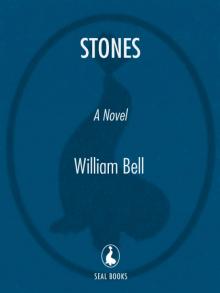 Stones
Stones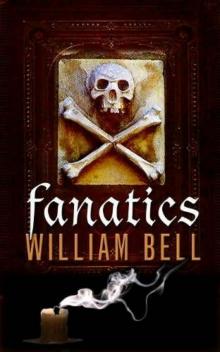 Fanatics
Fanatics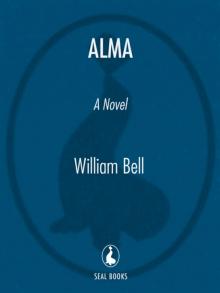 Alma
Alma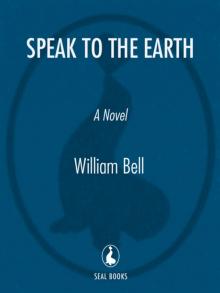 Speak to the Earth
Speak to the Earth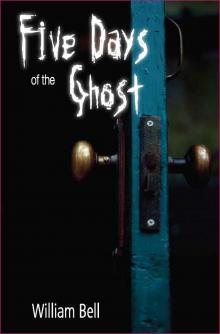 Five Days of the Ghost
Five Days of the Ghost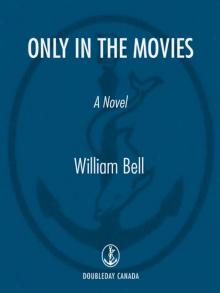 Only in the Movies
Only in the Movies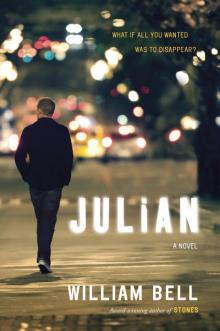 Julian
Julian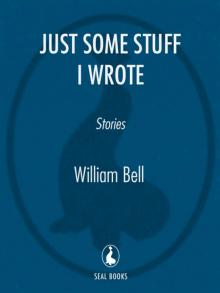 Just Some Stuff I Wrote
Just Some Stuff I Wrote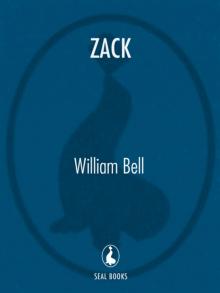 Zack
Zack Forbidden City
Forbidden City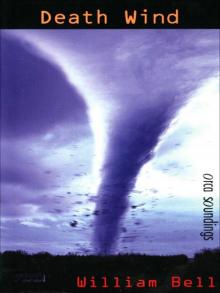 Death Wind
Death Wind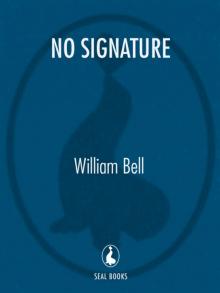 No Signature
No Signature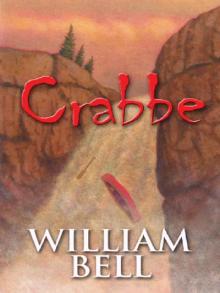 Crabbe
Crabbe